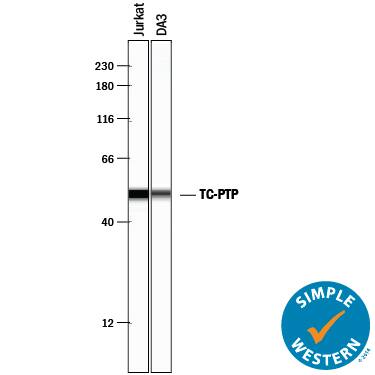Human/Mouse/Rat TC-PTP Antibody
R&D Systems, part of Bio-Techne | Catalog # AF1930

Key Product Details
Species Reactivity
Validated:
Cited:
Applications
Validated:
Cited:
Label
Antibody Source
Product Specifications
Immunogen
Pro2-Asn314
Accession # P17706
Specificity
Clonality
Host
Isotype
Scientific Data Images for Human/Mouse/Rat TC-PTP Antibody
Detection of Human/Mouse/Rat TC-PTP by Western Blot.
Western blot shows lysates of Jurkat human acute T cell leukemia cell line and DA3 mouse myeloma cell line. PVDF membrane was probed with 0.5 µg/mL of Goat Anti-Human/Mouse/Rat TC-PTP Antigen Affinity-purified Polyclonal Antibody (Catalog # AF1930) followed by HRP-conjugated Anti-Goat IgG Secondary Antibody (Catalog # HAF109). A specific band was detected for TC-PTP at approximately 45 to 48 kDa (as indicated). This experiment was conducted using Immunoblot Buffer Group 1.Detection of Human TC-PTP by Simple WesternTM.
Simple Western lane view shows lysates of Jurkat human acute T cell leukemia cell line and DA3 mouse myeloma cell line, loaded at 0.2 mg/mL. A specific band was detected for TC-PTP at approximately 51 kDa (as indicated) using 5 µg/mL of Goat Anti-Human/Mouse/Rat TC-PTP Antigen Affinity-purified Polyclonal Antibody (Catalog # AF1930) followed by 1:50 dilution of HRP-conjugated Anti-Goat IgG Secondary Antibody (Catalog # HAF109). This experiment was conducted under reducing conditions and using the 12-230 kDa separation system.Applications for Human/Mouse/Rat TC-PTP Antibody
Simple Western
Sample: Jurkat human acute T cell leukemia cell line and DA3 mouse myeloma cell line
Western Blot
Sample: Jurkat human acute T cell leukemia cell line and DA3 mouse myeloma cell line
Formulation, Preparation, and Storage
Purification
Reconstitution
Formulation
Shipping
Stability & Storage
- 12 months from date of receipt, -20 to -70 °C as supplied.
- 1 month, 2 to 8 °C under sterile conditions after reconstitution.
- 6 months, -20 to -70 °C under sterile conditions after reconstitution.
Background: TC-PTP
T-cell protein tyrosine phosphatase (TC-PTP), also known as PTPT and PTPN2, is an enzyme that removes phosphate groups covalently attached to tyrosine residues in proteins. This enzyme has two C-terminal end splice variants with distinctly different subcellular localizations. The shorter 45 kDa isoform is exclusively nuclear in resting cells, but redistrubutes to the cytosol upon stimulation with growth factors (1) and cellular stress (2). The longer 48 kDa isoform is exclusively found in the endoplasmic reticulum (3) and seems to have distinctly different physiologic substrates from the smaller isoform (1, 4). Although found in many cell types and tissues, TC-PTP is particularly prominent in hemopoietic cell types (5, 6). Knockout mice lacking TC-PTP are born viable but die 3 to 5 weeks after birth of erythropoietic and lymphopoietic deficits (7), indicating a critical role for TC-PTP in bone marrow maturation. TC-PTP will dephosphorylate a wide range of phosphoproteins, such as p52Shc (6) and receptors for EGF (1), Insulin (8) and growth hormone (6). The recombinant protein lacks the C-terminal 100 amino acids that determine intracellular localization but is fully active (9).
References
- Tiganis, T. et al. (1999) J. Biol. Chem. 274:27768.
- Lam, M.H. et al. (2001) J. Biol. Chem. 276:37700.
- Lorenzen, J.A. et al. (1995) J. Cell Biol. 131:631.
- Tiganis, T. et al. (1998) Mol. Cell. Biol. 18:1622.
- Cool, D.E. et al. (1989) Proc. Natl. Acad. Sci. USA 86:5257.
- Pasquali, C. et al. (2003) Mol. Endocrinol. 17:2228.
- You-Ten, K.E. et al. (1997) J. Exp. Med. 186:683.
- Galic, S. et al. (2003) Mol. Cell. Biol. 23:2096.
- Cool, D.E. et al. (1990) Proc. Natl. Acad. Sci. USA 87:7280.
Long Name
Alternate Names
Gene Symbol
UniProt
Additional TC-PTP Products
Product Documents for Human/Mouse/Rat TC-PTP Antibody
Product Specific Notices for Human/Mouse/Rat TC-PTP Antibody
For research use only

